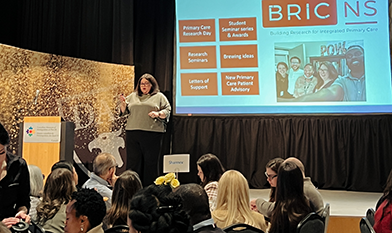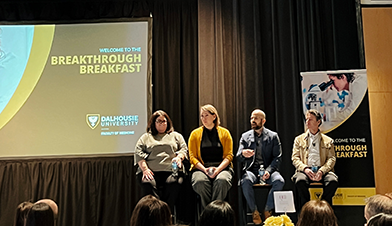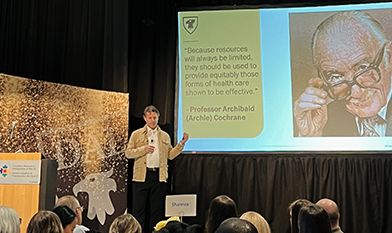News
» Go to news mainAI, Access & Innovation—What’s Shaping Primary Care Right Now
Family Medicine research took the spotlight at the latest Breakthrough Breakfast, selected by the Faculty of Medicine to showcase the cutting-edge work shaping the future of primary care.
With a sold-out crowd, this event highlighted the leading research within our department, demonstrating how faculty are tackling primary care access, AI-driven solutions, and data-informed policy changes.
More than just theory, these discussions explored real-world innovations that have the potential to transform family medicine.
From rethinking how primary care is delivered, to harnessing technology and interdisciplinary teams, this session made one thing clear: the future of family medicine is being shaped right now.
If you missed the event, here’s what stood out:
Redesigning Primary Care: An Equity-Focused ApproachDr. Emily Gard Marshall: [00:04:20-00:17:20] Dr. Emily Gard Marshall tackled one of Nova Scotia’s biggest challenges—primary care access—by highlighting the quadruple aim: improving population health outcomes, optimizing costs, enhancing patient experience, and prioritizing provider well-being. Her equity-focused research sheds light on how policy and system-level changes can improve continuity of care for underserved populations. She also emphasized that solving the primary care crisis requires looking beyond just increasing the number of providers—it’s about redesigning the system to work better for both patients and clinicians.
|
Beyond More Doctors: Fixing Systemic Gaps in Access to CareDr. Ruth Lavergne: [00:17:20-00:20:50] Dr. Ruth Lavergne challenged the assumption that more family doctors equal better access, revealing that systemic inefficiencies and administrative burdens are driving the widening care gap. While Canada has more family doctors than ever, access is still inequitable across income, housing, and racial lines. The nature of primary care work is also shifting, requiring more coordination per patient visit, alongside increasing responsibilities in paperwork, information management, and ethical decision-making. Ruth underscored how innovations like virtual care and better policy design could help rebalance the system and improve equity.
|
Harnessing AI & EMR Data to Transform Primary CareDr. Mathew Grandy: [00:20:50-00:25:50] Dr. Mathew Grandy explored how electronic medical records (EMRs) and AI can revolutionize primary care. Through MaRNet, EMR data are being leveraged to enhance medication management, particularly in projects like the Spider Project, which focuses on deprescribing inappropriate medications for polypharmacy patients. He also highlighted the potential of AI scribes, which could cut charting time by up to 50%, reducing burnout and allowing physicians to focus more on patient care. However, he cautioned that while AI can be a powerful tool, bias and ethical risks must be carefully managed.
|
The Future of Obesity Treatment: Balancing Innovation & AccessDr. Kevin Pottie: [00:25:50-00:29:00] Dr. Kevin Pottie explored the promise and limitations of new medications like Ozempic for obesity, diabetes, and heart disease. While these treatments are game-changers, he emphasized that they are most effective when combined with structured diet, exercise, and community-based programs. Affordability and equitable access remain major barriers, and Dr. Pottie stressed that physicians must adopt a guidance role, using technology and educational tools to support patients holistically rather than relying on prescriptions alone. These discussions reinforced the urgent need for policy shifts, technology integration, and innovative care models to address family medicine’s biggest challenges.
|
Recent News
- $100,000 James Walker Wood Award in Family Medicine
- Content analysis of Dalhousie University family medicine residents’ scholarly projects: What do they write about?
- Pre‑Conference Workshop on Diabetes & Equity at the International Refugee and Migrant Health Conference 2025
- AI, Access & Innovation—What’s Shaping Primary Care Right Now
- Welcome Dr. Matthew Lee
- Winning a National Award!
- Welcome Dr. Janet Green to the Department of Family Medicine!
- Welcome Dr. Kevin Pottie





